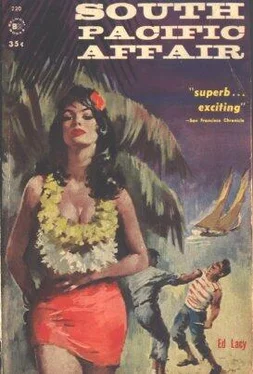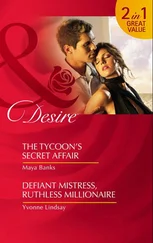Ed Lacy - South Pacific Affair
Здесь есть возможность читать онлайн «Ed Lacy - South Pacific Affair» весь текст электронной книги совершенно бесплатно (целиком полную версию без сокращений). В некоторых случаях можно слушать аудио, скачать через торрент в формате fb2 и присутствует краткое содержание. Жанр: Старинная литература, на русском языке. Описание произведения, (предисловие) а так же отзывы посетителей доступны на портале библиотеки ЛибКат.
- Название:South Pacific Affair
- Автор:
- Жанр:
- Год:неизвестен
- ISBN:нет данных
- Рейтинг книги:5 / 5. Голосов: 1
-
Избранное:Добавить в избранное
- Отзывы:
-
Ваша оценка:
- 100
- 1
- 2
- 3
- 4
- 5
South Pacific Affair: краткое содержание, описание и аннотация
Предлагаем к чтению аннотацию, описание, краткое содержание или предисловие (зависит от того, что написал сам автор книги «South Pacific Affair»). Если вы не нашли необходимую информацию о книге — напишите в комментариях, мы постараемся отыскать её.
South Pacific Affair — читать онлайн бесплатно полную книгу (весь текст) целиком
Ниже представлен текст книги, разбитый по страницам. Система сохранения места последней прочитанной страницы, позволяет с удобством читать онлайн бесплатно книгу «South Pacific Affair», без необходимости каждый раз заново искать на чём Вы остановились. Поставьте закладку, и сможете в любой момент перейти на страницу, на которой закончили чтение.
Интервал:
Закладка:
Finally Nancy told me: “You don't understand. I am not Titi's mother but he is the son of Louise's mother. You see, I am Louise's mama faa-amu —the mother who gives to eat. I am her adopted mother.”
I said, “Oh,” and grinned stupidly. That meant Ruita was a full-blooded islander, which didn't mean a thing to me; and it also meant she didn't have the old lady's syph, which had been a tiny worry way back in my mind.
A stocky man in a new white T-shirt and old pants, who had been busy examining our rigging, now came over and hugged Nancy and then shook my hand, said he was Cumber, Chief of Forliga, and welcomed me to the atoll.
Actually Forliga was a number of small islets, one large atoll and one smaller one, all of it shaped like a rough horseshoe and surrounded by a reef. The lagoon was about fifteen miles long and nearly five miles wide, dotted with islets and coral heads. The highest land didn't seem more than eight feet above sea level, and neither of the two 'big' atolls were over five hundred yards wide. There were two villages, clusters of huts on the atoll, and we were heading toward the larger and main village.
More canoes joined us as we tied up to a dock made of jagged hunks of coral. Nancy and Ruita were swept ashore in a crowd of laughing men, women, and kids. They went over to Titi's house and Eddie and I stayed on the cutter: I cleaned up the motor, aired the bilge for gas fumes, while Eddie politely asked an old man about copra and was assured that within a few days, after the wedding feast, enough would be made to fill our hold. Eddie asked if there had been many marriages lately and found the usual shortage of women. He told me, voice glum, “Goddamn, I won't have a chance. This old man says there are bachelors on the atoll looking for gals to marry.”
Followed by a gang of laughing kids we finally reached Titi's large hut where we met his bride, a small and very cute young girl, who seemed to be four or five months pregnant—a fact which amused many of the islanders, although not the outhouse type of smirking it would cause back in the States. Many women patted her bulging stomach and congratulated the would-be bride and groom. Titi said that although it was his first child, he was sure when the pregnancy started and in a matter-of-fact voice described in detail violent love-making they had done “right after I returned from the diving season—that very night.”
After meeting the bride we were introduced to the entire population—some two hundred and thirty-two people—and I shook hands with all of them like a politician.
It was decided to have the wedding before nightfall. It seemed everything was in readiness, and had been for many days, awaiting our arrival. Everybody immediately pedaled away on their bikes and soon returned with cleaned pigs, fish, taro and all sorts of fruits and vegetables. A huge fire was started in a sand pit to heat the cooking stones.
At one end of the short village 'street' was a tiny church, complete with a small spire, all of it made of coral blocks so bleached and whitewashed it hurt your eyes. Somebody was ringing the bell in the steeple like crazy, and the frantic bell-ringing seemed to keep time for the frenzy of activity we saw all about us.
Women were busy burning coconut fiber husks to make charcoal for their irons. Many people had already bathed in the lagoon and changed into their Sunday clothes: the men in berets and badly fitting suits, the women in clean starched white dresses and broad hats. For the wedding feast they had bought out the Chinese storekeeper's entire stock of canned goods—on credit against the next diving season. A kind of deacon of the church and two catechists would perform the ceremony, which was really more of a singing festival than a marriage service. When the regular priest made his yearly visit to the atoll, he would “legally” marry Titi and his bride, and all other couples who had “married” since his last visit. But after tonight, Cumber the Chief would officially enter Titi's marriage in his records.
We had to dress for the wedding so Ruita took my arm and we ran back to the boat, sprinting like a couple of fools, to get her bags. She seemed very excited and the excitement had reached me too. We found Eddie handing out samples of our stomach medicine to a group of men who gravely said it was very fine and wanted to add several bottles to the punch, which the bride's father and brothers were mixing in four ten-gallon tins. The punch consisted of vanilla pods for taste, bottles of rum and hair oil and a little water. Other tins of coconut and orange beer had been brewing for days, so the entire atoll was set to tie on a good one.
I got Ruita's bags, and her mother's, and we took them up to the guest hut. Once inside Ruita kissed me, whispered, “Sometime in the morning, when we have finished sleeping off the meal, you and I are going away.”
“Where?”
“To a place where we will be alone—as you wish. I have arranged all things. Now hurry and dress, it is getting dark and the services will start soon so—”
Some old duck burst into the hut and gave Ruita a bear hug, including a gentle slap on her behind. Then he eagerly shook my hand and told me in Tahitian how happy he was to see me and I must see his “popaa machine” at once.
Ruita said, “This one is a sort of uncle of mine. A rarity in the islands—he is a miser. He even still has some bird money.”
“What's that?”
“You know nothing about the islands,” she said, teasing me. “Everything I must explain to you—except making love; that you do well on your own, Bird money is from the old days when the whalers used Chilean silver dollars. These have a big eagle on the face, so they were called bird money. But now they have disappeared.”
“They have not disappeared for me,” the old man said, “I do not spend my money foolishly. Also, they are quite beautiful for their own sake, if rubbed well with a soft cloth. I have the best motor in all the islands and this too shines like coins when rubbed. It cost me many thousand taras. I must show you to it, it is a motor for the outside of a boat. Unhappily it no longer works and therefore I hope you may be able to repair it.”
I said I would be happy to see it and Ruita told me in English, “Look at his motor now or he will be hurt, but do it quickly. Then dress your best.”
I followed the old joker to his hut, and there I found a gleaming twenty horsepower outboard motor on an aluminum rack. “This is mine,” the man said proudly, as if showing off a jewel. “It cost many taras and is it not a thing of much beauty?”
I told him it was as beautiful as a sunset. A tara is a Polynesian dollar and equal to five Tahitian francs. This outboard probably sold for around three hundred dollars in the States, and at least a grand to this old man after he paid the various shipping charges. I said in my best Tahitian, “I am sure this makes a canoe travel with the speed of a shark.”
“Like the fastest fish it went on water—but only once. Then it does not work, although I give it clean petrol. Can you repair it?”
I found the name plate on the motor and felt sorry for the old guy—they had sent him a fresh water model, and what it needed was cleaning and oiling, scrape off the salt water corrosion.
“Can this popaa marvel be made to run with speed of a flying fish once more?”
“I think so.”
He had a large-featured face with a great nose and deep wrinkles, a rather solemn puss, but now it became one big smile as he shook my hand hard, asking, “You can truly do this?”
“If nothing is broken I will make it run again.”
“You will make me most happy. For an old man, new happiness is a rare thing. I make many sacks of copra for you. If I was younger, I would dive and bring you shell for trade.”
Читать дальшеИнтервал:
Закладка:
Похожие книги на «South Pacific Affair»
Представляем Вашему вниманию похожие книги на «South Pacific Affair» списком для выбора. Мы отобрали схожую по названию и смыслу литературу в надежде предоставить читателям больше вариантов отыскать новые, интересные, ещё непрочитанные произведения.
Обсуждение, отзывы о книге «South Pacific Affair» и просто собственные мнения читателей. Оставьте ваши комментарии, напишите, что Вы думаете о произведении, его смысле или главных героях. Укажите что конкретно понравилось, а что нет, и почему Вы так считаете.











